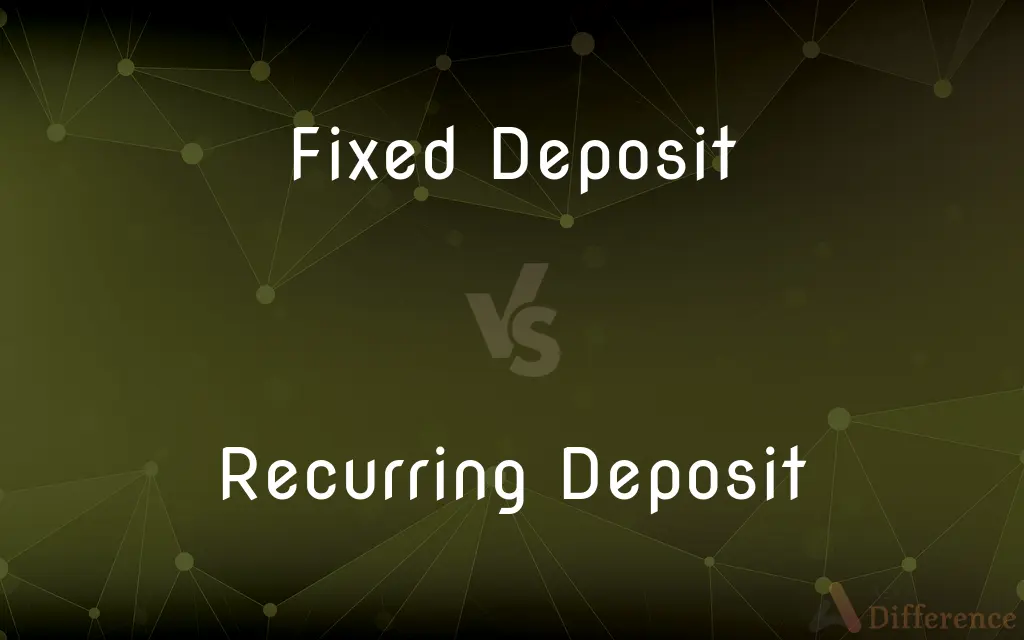Fixed Deposit vs. Recurring Deposit — What's the Difference?
By Tayyaba Rehman — Published on November 11, 2023
Fixed Deposit is a one-time lump sum deposit for a set duration with fixed interest. Recurring Deposit involves regular monthly deposits for a fixed term, also earning interest.

Difference Between Fixed Deposit and Recurring Deposit
Table of Contents
ADVERTISEMENT
Key Differences
Fixed Deposit, commonly abbreviated as FD, is a financial instrument where individuals deposit a lump sum of money with a financial institution, usually a bank, for a predetermined period. The interest rate for a Fixed Deposit is set at the time of deposit, ensuring the rate remains constant throughout the term, irrespective of market fluctuations. This offers investors a guaranteed return on their money.
On the other hand, a Recurring Deposit, often referred to as RD, is a type of deposit account where individuals make regular, typically monthly, contributions. This allows people to invest a fixed amount every month into their Recurring Deposit account. Like the Fixed Deposit, the interest rate for a Recurring Deposit is fixed at the outset and remains unchanged for the entire tenure.
While both Fixed Deposit and Recurring Deposit are popular savings tools, they cater to different saving habits. Fixed Deposits are ideal for those who have a considerable amount of money to deposit at once and want to lock it away to earn interest. The principal amount remains untouched until maturity.
Recurring Deposits, in contrast, are designed for individuals who might not have a large sum to invest initially but can commit to regular monthly contributions. By the end of the tenure of a Recurring Deposit, both the invested amount and the accumulated interest are returned to the investor.
Despite their differences, both Fixed Deposit and Recurring Deposit are considered safe investment options, especially when compared to equity markets. They offer a stable return and are typically insured, making them attractive to risk-averse investors.
ADVERTISEMENT
Comparison Chart
Initial Deposit
Lump sum amount at once.
Regular monthly deposits.
Interest Rate
Fixed at the start and remains constant.
Also fixed and constant through tenure.
Suitability
For those with a bulk amount to invest once.
For regular, smaller investments.
Flexibility in Contribution
No further contributions allowed.
Contributions made every month.
Purpose
To lock a large sum and earn interest.
To build savings over time with regular contributions.
Compare with Definitions
Fixed Deposit
A financial instrument with a lump sum deposit and fixed tenure.
I invested my inheritance in a Fixed Deposit for security.
Recurring Deposit
Enables building a substantial amount over time.
With his Recurring Deposit, he saved enough for his trip abroad.
Fixed Deposit
Safe and insured form of investment.
Many prefer Fixed Deposits for the assurance and safety they offer.
Recurring Deposit
Generally incurs penalties for missed contributions.
He ensured timely payments to avoid Recurring Deposit penalties.
Fixed Deposit
Typically matures after a set period, ranging from months to years.
His Fixed Deposit will mature in five years, offering a hefty return.
Recurring Deposit
A savings tool with regular monthly contributions.
To inculcate a saving habit, she started a Recurring Deposit.
Fixed Deposit
Offers guaranteed interest rates unaffected by market changes.
The Fixed Deposit's constant rate appealed to her amidst market volatility.
Recurring Deposit
Fixed interest rate set at account inception.
The Recurring Deposit provided her a steady interest over its term.
Fixed Deposit
Cannot be prematurely withdrawn without penalties.
She faced a penalty for breaking her Fixed Deposit before its maturity.
Recurring Deposit
Suitable for individuals without large initial sums.
A Recurring Deposit is perfect for those starting their savings journey.
Common Curiosities
Are the interest rates the same for both?
While both have fixed interest rates, the actual rates may vary between Fixed Deposit and Recurring Deposit.
How often do I contribute to a Recurring Deposit?
Typically, contributions to a Recurring Deposit are made monthly.
What is a Fixed Deposit?
A Fixed Deposit is a lump sum deposit made for a predetermined period with a fixed interest rate.
Can I withdraw my Fixed Deposit early?
Yes, but premature withdrawal usually incurs a penalty.
Can I open a Recurring Deposit without a large sum?
Yes, Recurring Deposits are designed for regular, smaller contributions over time.
What if I miss a monthly payment for my Recurring Deposit?
Missing a payment might result in a penalty or reduced interest.
Which offers a higher interest rate?
Interest rates vary by institution and market conditions, but Fixed Deposits might offer slightly higher rates than Recurring Deposits.
How is a Recurring Deposit different?
Recurring Deposit requires regular monthly contributions over a fixed term with a set interest rate.
Can I add more to my Fixed Deposit later?
No, a Fixed Deposit doesn't allow additional contributions after the initial deposit.
Which is better for a short-term investment?
Fixed Deposits can be tailored for short-term periods, making them suitable for brief investments.
Share Your Discovery

Previous Comparison
London vs. The City of London
Next Comparison
Cheque vs. Demand DraftAuthor Spotlight
Written by
Tayyaba RehmanTayyaba Rehman is a distinguished writer, currently serving as a primary contributor to askdifference.com. As a researcher in semantics and etymology, Tayyaba's passion for the complexity of languages and their distinctions has found a perfect home on the platform. Tayyaba delves into the intricacies of language, distinguishing between commonly confused words and phrases, thereby providing clarity for readers worldwide.















































